人教新目标(Go for it)版九年级全册Unit 1 How can we become good learners. Section A课件(共48张PPT)
文档属性
| 名称 | 人教新目标(Go for it)版九年级全册Unit 1 How can we become good learners. Section A课件(共48张PPT) |
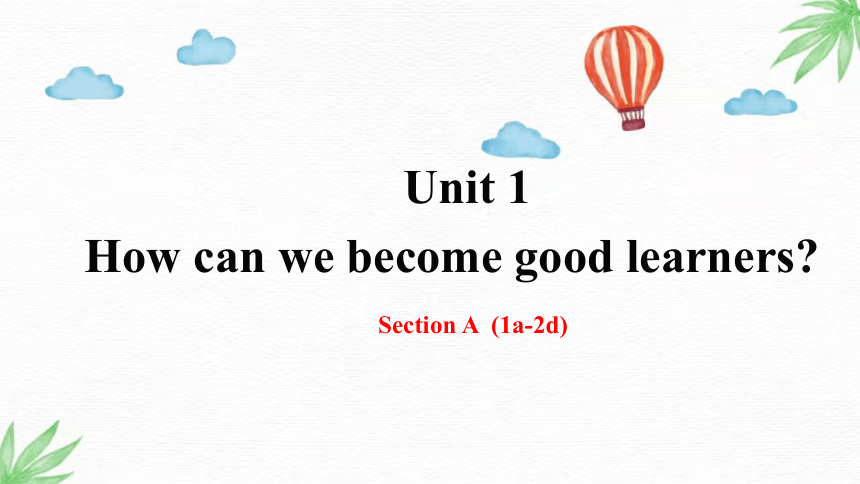
|
|
| 格式 | ppt | ||
| 文件大小 | 1.6MB | ||
| 资源类型 | 教案 | ||
| 版本资源 | 人教新目标(Go for it)版 | ||
| 科目 | 英语 | ||
| 更新时间 | 2022-09-24 00:00:00 | ||
图片预览

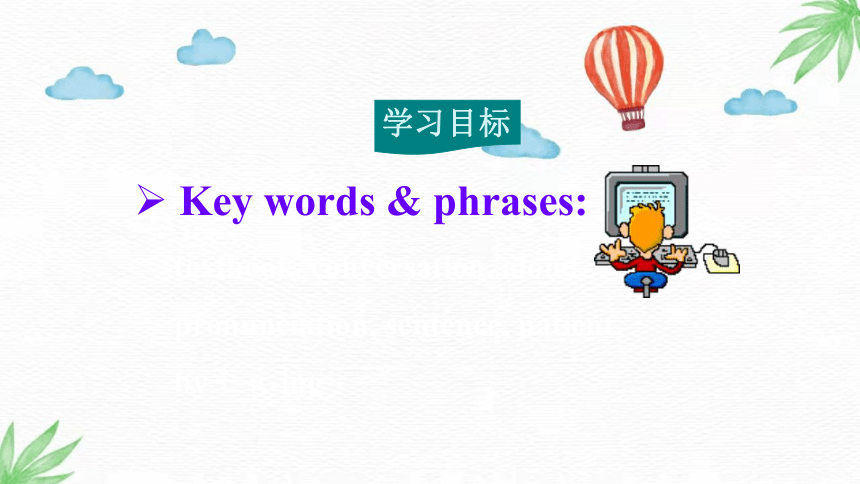
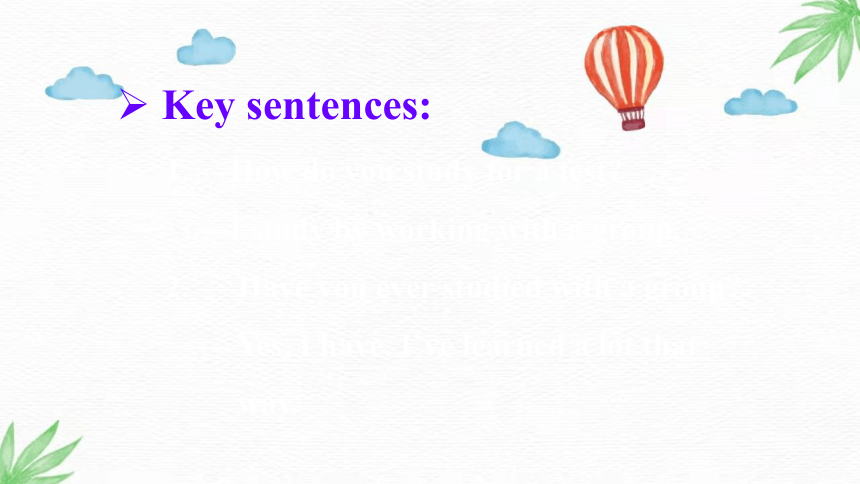
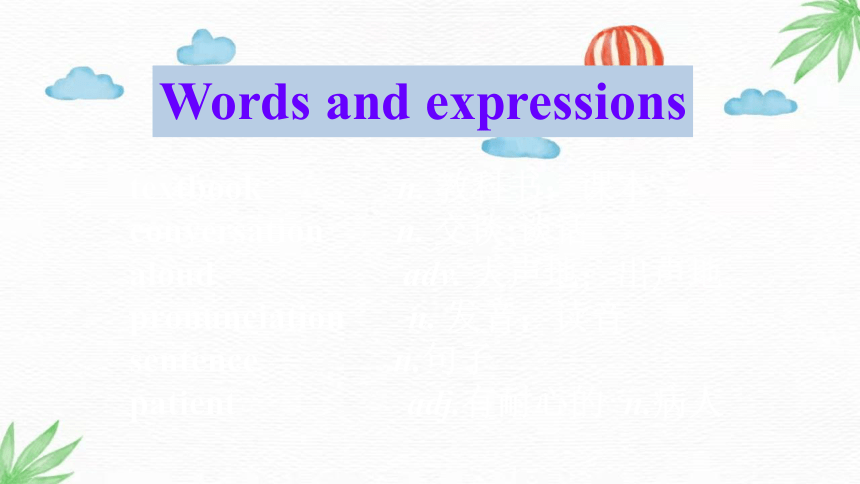
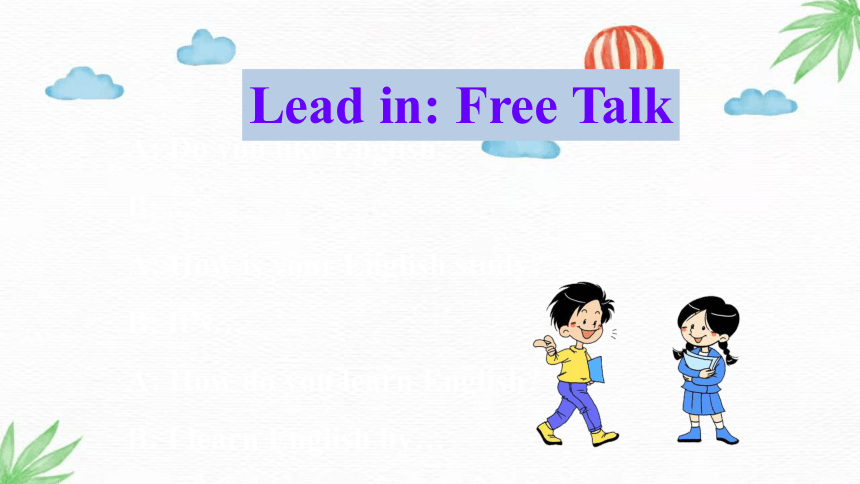
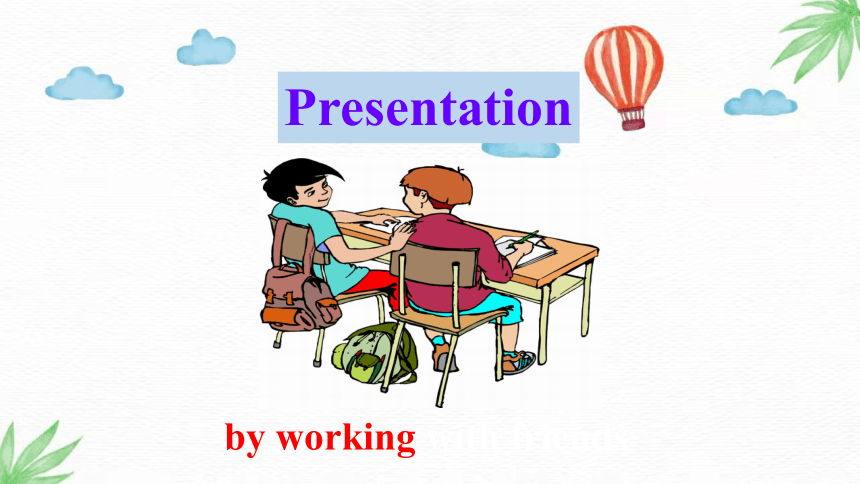
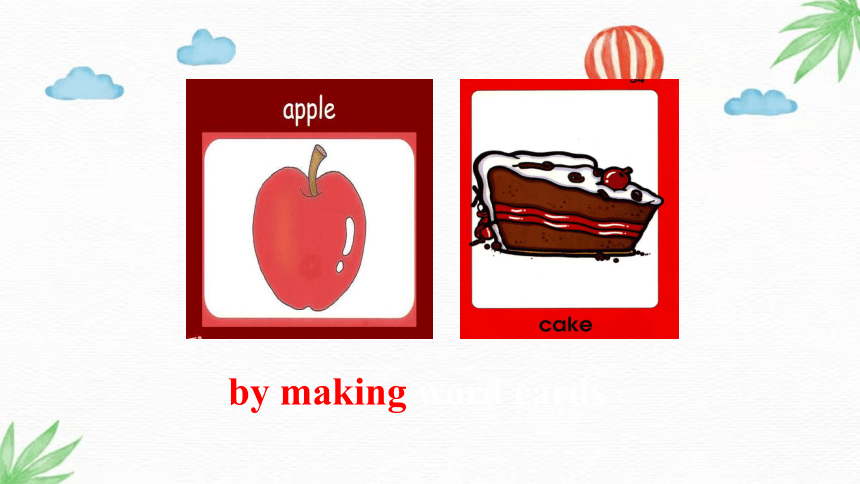
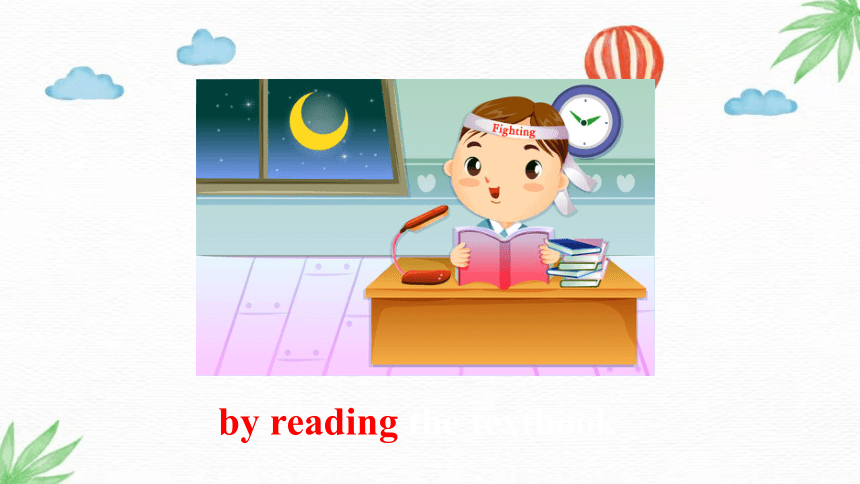
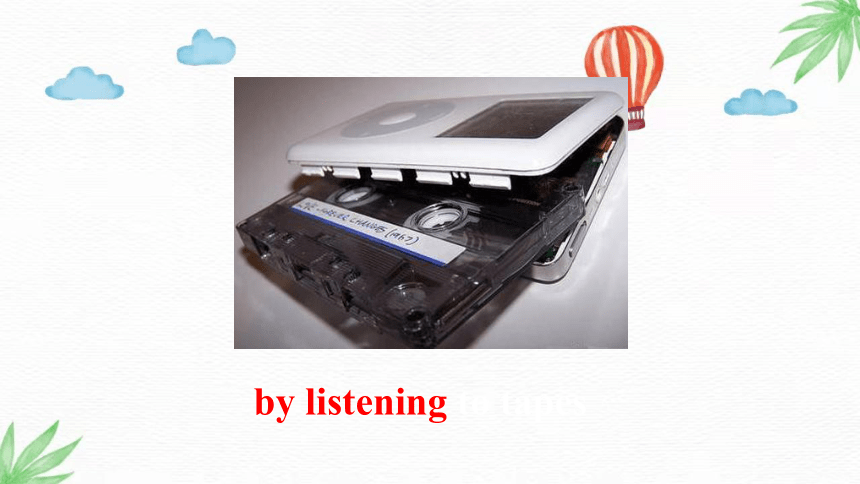
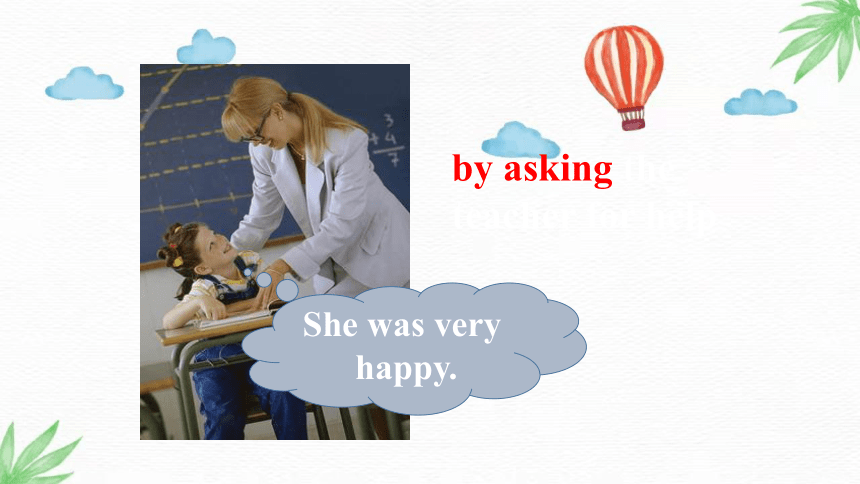
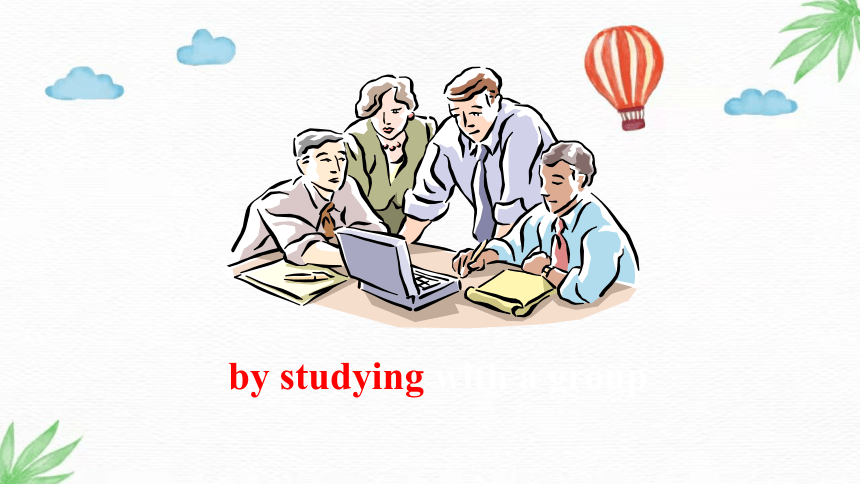
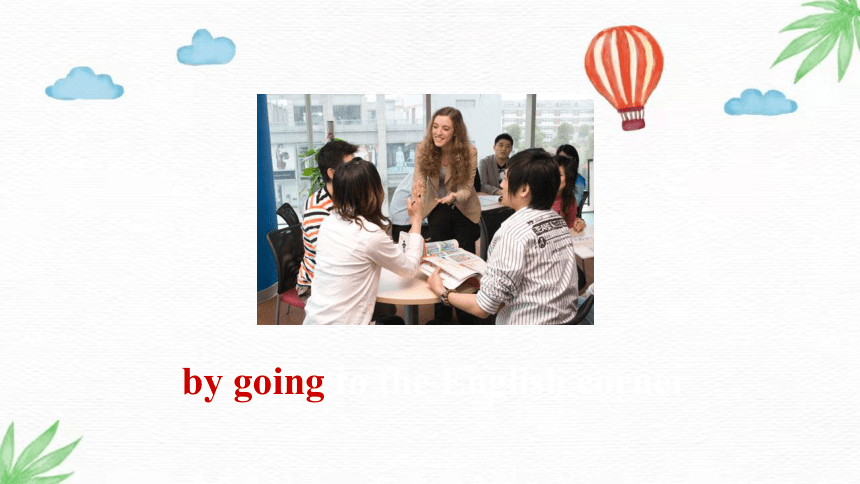
文档简介
(共48张PPT)
Unit 1
How can we become good learners
Section A (1a-2d)
Key words & phrases:
textbook, conversation, aloud,
pronunciation, sentence, patient,
by+ v.-ing
学习目标
Key sentences:
1. —How do you study for a test
—I study by working with a group.
2. — Have you ever studied with a group
— Yes, I have. I’ve learned a lot that
way.
textbook n. 教科书;课本
conversation n. 交谈;谈话
aloud adv. 大声地;出声地
pronunciation n. 发音;读音
sentence n.句子
patient adj.有耐心的 n.病人
Words and expressions
A: Do you like English
B: ...
A: How is your English study
B: It’s…
A: How do you learn English
B: I learn English by…
Lead in: Free Talk
by working with friends
Presentation
by making word cards
by reading the textbook
by listening to tapes
by asking the
teacher for help
She was very
happy.
by studying with a group
by going to the English corner
by watching English movies
What are the other ways you sometimes use
I study English by reading English news-
papers.
by singing English songs.
by reading English stories.
by…
常常表示手段、方式或方法,可以用来回答how引导的特殊疑问句。
—How do you learn English
—I learn English by watching
English movies.
by + v.-ing
Practice
单项选择
( )1.—_____ do you prepare for an
English exam
—By reading texts.
A.What B.Where C.How D.How often
( )2.He makes a living by _____.
A.teach B.teaching C.teach D.teaches
C
B
Check ( ) the ways you study for
an English test. Then add other ways
you sometimes study.
____a. by working with friends
____b. by making word cards
√
1a
____c. by reading the textbook
____d. by listening to tapes
____e. by asking the teacher for help ________________________________
_________________________________________
_________________________________________
f. by doing grammar exercise
g. by keeping a diary in English
...
1b
Listen. How do these students study for a test Write letters from 1a above.
____
1. Meiping
____
2. Peter
____
3. Tony
b
e
d
1c
A: How do you study for a test
B: I study by working with a group.
Pair-work
Listen and check ( ) the questions you hear.
2a
Questions
1. ___ Does anyone learn English by watching
videos
2. __ Do you have conversations with friends
in English
√
3. __ What about listening to tapes
4. __ What about reading aloud to practice
pronunciation
5. __Have you ever studied with a group
Listen again. Match each question
above with an answer below.
a. Yes, I have. I’ve learned a lot that way.
b. Oh, yes. It improves my speaking skills.
c. I do that sometimes. I think it helps.
d. No. It’s too hard to understand spoken English.
2b
1. __ Do you learn English by watching videos
2. __ Do you have conversations with friend in
English
3. __ What about listening to tapes
4. __ What about reading aloud to practice
pronunciation
5. __ Have you ever studied with a group
d
b
c
a
2c
Make conversations using the infor-
mation in 2a and 2b.
A: Have you ever studied with a group
B: Yes, I have. I’ve learned a lot that way.
2d
Role-play the conversation.
Jack: Annie, I’m a little nervous.
I have to finish reading a
book and give a report next
Monday.
Annie: That doesn’t sound too bad.
Jack: But I'm a very slow reader.
Annie: Just read quickly to get the main
ideas. Don't read word by word,
read word groups.
Jack: But I don't understand many of the
words. I have to use a dictionary.
Annie: Try to guess a word's meaning by
reading the sentences before and
after it. You probably understand
more than you think.
1. how引导特殊疑问句
①how 用来询问做事的方式或手段,意为 “怎样、如何”。
—How do you study for a test
—I study by working with friends.
Language Points
②how 用在问候语中。
e.g. How do you do 你好!
这是初次见面时的问候语,
答语也用How do you do
③how用来询问身体健康状况, 意为“怎么样”。
e.g. — How is your mother
— She is very well.
2. by 的用法
by 介词, 表示“通过……方法或途径”, 译成“靠, 通过”, 后面可加名词、名词短语或动名词。可用来回答how引导的特殊疑问句。
1) —How do you study English
—你怎样学习英语?
—I study by watching English movies.
—我通过看英文电影学英语。
2) travel by air / land / sea
航空(陆路,航海)旅行
3) go by train / boat / bus
乘火车(船,公共汽车)去
4) shake sb. by the hand 和某人握手
5) The house was destroyed by fire.
房屋被火烧毁了。
另外, by作为介词的意义有很多, 例如:
1)在…...旁边,靠近
There is a power station by the river.
河边有一个电厂。
2)沿着,经由
to enter by the door 由门进去
3)由于
by mistake 由于差错;错误地
4)被,由
some articles written by Lu Xun
一些由鲁迅写的文章
5)逐一;连续
one by one 一个接一个
have studied 是现在完成时,在此表示从过去到现在为止,你有没有和小组一起学习过?
3. Have you ever studied with a group
你曾经和小组一起学习过吗?
现在完成时 (Present Perfect)
定义:表示过去发生的某一动作对现在造成的影响或产生的结果;或这一动作开始于过去,持续到现在,并有可能继续持续下去。
1. 肯定句:have (has)+过去分词
2. 否定句:haven’t(hasn’t)+过去分词
3. 疑问句: Have/Has +主语+过去分词
肯定回答:Yes, …have (has).
否定回答:No, …haven’t (hasn’t).
连用时间状语:already, yet, ever, never, just, before, several times 等。
现在完成时的基本句式:
现在完成时&一般过去时
现在完成时 一般过去时
同 都和过去发生的事情有关
异 强调这一动作与现在的关系,如对现在产生的结果、影响等 只表示过去的事实,不表示和现在的关系。
e.g. 1
I have just been to London. I went there last month.我刚去过伦敦,是上个月去的。
e.g. 2
I have been to the science museum many times. I went there on our last summer vacation.
我已经去了科学博物馆很多次。去年暑假我还去了呢。
1. A: Do you want _________ (come) to the space museum
B: No, I’ve already _____ (be) there three times.
2. A: Have you ______ (see) the robots at the science museum
B: Yes, I ______ (go) there last weekend.
I.用括号中所给单词的适当形式填空。
to come
been
seen
went
Practice
Ⅱ.单项选择。 1. The Oriental Pearl TV Tower ______ thou-sands of visitors since 1995. A. attracted B. attracts
C. has attracted D. will attract
C
2. Youth《芳华》 is a very nice film. I _____ it twice.
A. will see B. have seen
C. saw D. see
B
Exercises
Ⅰ.单项选择。
( )1.More and more people in Shanghai
choose to go to work _____ underground.
A.in B.with C.by D.for
( )2.—_____ do you usually study for a
math test
—By doing exercise.
A.What B.How C.Why D.When
C
B
Ⅱ.用括号内单词的适当形式填空。
1.I often learn English by _______(watch)
English movies.
2.I usually go to school by _____(bike).
3.I _______ (see) the TV play Tribes and
Empires:Storm of Prophecy《九州·海
上牧云记》twice.
watching
bike
have seen
Summary
1. learned some learning ways.
2. Learned the structure —“by +
v.-ing ”
3. Reviewed Present Perfect
Homework
Memorize the new words and phrases.
Preview the passage in 3a.
谢 谢
Unit 1
How can we become good learners
Section A (1a-2d)
Key words & phrases:
textbook, conversation, aloud,
pronunciation, sentence, patient,
by+ v.-ing
学习目标
Key sentences:
1. —How do you study for a test
—I study by working with a group.
2. — Have you ever studied with a group
— Yes, I have. I’ve learned a lot that
way.
textbook n. 教科书;课本
conversation n. 交谈;谈话
aloud adv. 大声地;出声地
pronunciation n. 发音;读音
sentence n.句子
patient adj.有耐心的 n.病人
Words and expressions
A: Do you like English
B: ...
A: How is your English study
B: It’s…
A: How do you learn English
B: I learn English by…
Lead in: Free Talk
by working with friends
Presentation
by making word cards
by reading the textbook
by listening to tapes
by asking the
teacher for help
She was very
happy.
by studying with a group
by going to the English corner
by watching English movies
What are the other ways you sometimes use
I study English by reading English news-
papers.
by singing English songs.
by reading English stories.
by…
常常表示手段、方式或方法,可以用来回答how引导的特殊疑问句。
—How do you learn English
—I learn English by watching
English movies.
by + v.-ing
Practice
单项选择
( )1.—_____ do you prepare for an
English exam
—By reading texts.
A.What B.Where C.How D.How often
( )2.He makes a living by _____.
A.teach B.teaching C.teach D.teaches
C
B
Check ( ) the ways you study for
an English test. Then add other ways
you sometimes study.
____a. by working with friends
____b. by making word cards
√
1a
____c. by reading the textbook
____d. by listening to tapes
____e. by asking the teacher for help ________________________________
_________________________________________
_________________________________________
f. by doing grammar exercise
g. by keeping a diary in English
...
1b
Listen. How do these students study for a test Write letters from 1a above.
____
1. Meiping
____
2. Peter
____
3. Tony
b
e
d
1c
A: How do you study for a test
B: I study by working with a group.
Pair-work
Listen and check ( ) the questions you hear.
2a
Questions
1. ___ Does anyone learn English by watching
videos
2. __ Do you have conversations with friends
in English
√
3. __ What about listening to tapes
4. __ What about reading aloud to practice
pronunciation
5. __Have you ever studied with a group
Listen again. Match each question
above with an answer below.
a. Yes, I have. I’ve learned a lot that way.
b. Oh, yes. It improves my speaking skills.
c. I do that sometimes. I think it helps.
d. No. It’s too hard to understand spoken English.
2b
1. __ Do you learn English by watching videos
2. __ Do you have conversations with friend in
English
3. __ What about listening to tapes
4. __ What about reading aloud to practice
pronunciation
5. __ Have you ever studied with a group
d
b
c
a
2c
Make conversations using the infor-
mation in 2a and 2b.
A: Have you ever studied with a group
B: Yes, I have. I’ve learned a lot that way.
2d
Role-play the conversation.
Jack: Annie, I’m a little nervous.
I have to finish reading a
book and give a report next
Monday.
Annie: That doesn’t sound too bad.
Jack: But I'm a very slow reader.
Annie: Just read quickly to get the main
ideas. Don't read word by word,
read word groups.
Jack: But I don't understand many of the
words. I have to use a dictionary.
Annie: Try to guess a word's meaning by
reading the sentences before and
after it. You probably understand
more than you think.
1. how引导特殊疑问句
①how 用来询问做事的方式或手段,意为 “怎样、如何”。
—How do you study for a test
—I study by working with friends.
Language Points
②how 用在问候语中。
e.g. How do you do 你好!
这是初次见面时的问候语,
答语也用How do you do
③how用来询问身体健康状况, 意为“怎么样”。
e.g. — How is your mother
— She is very well.
2. by 的用法
by 介词, 表示“通过……方法或途径”, 译成“靠, 通过”, 后面可加名词、名词短语或动名词。可用来回答how引导的特殊疑问句。
1) —How do you study English
—你怎样学习英语?
—I study by watching English movies.
—我通过看英文电影学英语。
2) travel by air / land / sea
航空(陆路,航海)旅行
3) go by train / boat / bus
乘火车(船,公共汽车)去
4) shake sb. by the hand 和某人握手
5) The house was destroyed by fire.
房屋被火烧毁了。
另外, by作为介词的意义有很多, 例如:
1)在…...旁边,靠近
There is a power station by the river.
河边有一个电厂。
2)沿着,经由
to enter by the door 由门进去
3)由于
by mistake 由于差错;错误地
4)被,由
some articles written by Lu Xun
一些由鲁迅写的文章
5)逐一;连续
one by one 一个接一个
have studied 是现在完成时,在此表示从过去到现在为止,你有没有和小组一起学习过?
3. Have you ever studied with a group
你曾经和小组一起学习过吗?
现在完成时 (Present Perfect)
定义:表示过去发生的某一动作对现在造成的影响或产生的结果;或这一动作开始于过去,持续到现在,并有可能继续持续下去。
1. 肯定句:have (has)+过去分词
2. 否定句:haven’t(hasn’t)+过去分词
3. 疑问句: Have/Has +主语+过去分词
肯定回答:Yes, …have (has).
否定回答:No, …haven’t (hasn’t).
连用时间状语:already, yet, ever, never, just, before, several times 等。
现在完成时的基本句式:
现在完成时&一般过去时
现在完成时 一般过去时
同 都和过去发生的事情有关
异 强调这一动作与现在的关系,如对现在产生的结果、影响等 只表示过去的事实,不表示和现在的关系。
e.g. 1
I have just been to London. I went there last month.我刚去过伦敦,是上个月去的。
e.g. 2
I have been to the science museum many times. I went there on our last summer vacation.
我已经去了科学博物馆很多次。去年暑假我还去了呢。
1. A: Do you want _________ (come) to the space museum
B: No, I’ve already _____ (be) there three times.
2. A: Have you ______ (see) the robots at the science museum
B: Yes, I ______ (go) there last weekend.
I.用括号中所给单词的适当形式填空。
to come
been
seen
went
Practice
Ⅱ.单项选择。 1. The Oriental Pearl TV Tower ______ thou-sands of visitors since 1995. A. attracted B. attracts
C. has attracted D. will attract
C
2. Youth《芳华》 is a very nice film. I _____ it twice.
A. will see B. have seen
C. saw D. see
B
Exercises
Ⅰ.单项选择。
( )1.More and more people in Shanghai
choose to go to work _____ underground.
A.in B.with C.by D.for
( )2.—_____ do you usually study for a
math test
—By doing exercise.
A.What B.How C.Why D.When
C
B
Ⅱ.用括号内单词的适当形式填空。
1.I often learn English by _______(watch)
English movies.
2.I usually go to school by _____(bike).
3.I _______ (see) the TV play Tribes and
Empires:Storm of Prophecy《九州·海
上牧云记》twice.
watching
bike
have seen
Summary
1. learned some learning ways.
2. Learned the structure —“by +
v.-ing ”
3. Reviewed Present Perfect
Homework
Memorize the new words and phrases.
Preview the passage in 3a.
谢 谢
同课章节目录
- Unit 1 How can we become good learners.
- Section A
- Section B
- Unit 2 I think that mooncakes are delicious!
- Section A
- Section B
- Unit 3 Could you please tell me where the restroom
- Section A
- Section B
- Unit 4 I used to be afraid of the dark.
- Section A
- Section B
- Unit 5 What are the shirts made of?
- Section A
- Section B
- Review of Units 1-5
- Unit 6 When was it invented?
- Section A
- Section B
- Unit 7 Teenagers should be allowed to choose their
- Section A
- Section B
- Unit 8 It must belong to Carla.
- Section A
- Section B
- Unit 9 I like music that I can dance to.
- Section A
- Section B
- Unit 10 You're supposed to shake hands.
- Section A
- Section B
- Review of Units 6-10
- Unit 11 Sad movies make me cry.
- Section A
- Section B
- Unit 12 Life is full of the unexpected
- Section A
- Section B
- Unit 13 We're trying to save the earth!
- Section A
- Section B
- Unit 14 I remember meeting all of you in Grade 7.
- Section A
- Section B
- Review of Units 11-14
